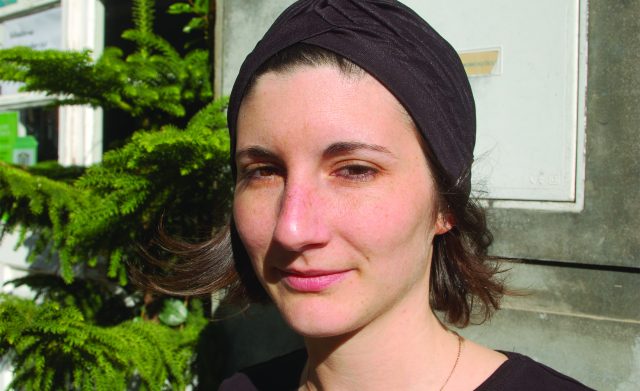
Reducing meat consumption is a challenge, a positive or a negative thing? The food in Monchique is based on pork…
I think it’s more a change in habits. For me, it’s actually more pleasant. It seems that natural things look better … Vegetarian food looks attractive and it tastes better.
Do you have your own vegetable garden?
Yes, we have a little vegetable garden. And the citrus fruits all come from Lagos. We use them here at Óchálá. And from there we also get all the herbal infusions and plants with which we make the teas. We spend some time there, learning how to make a small garden for ourselves. And we have turnip greens, lettuce, cabbages, tomato and, in summer, we will have garlic and radishes.
Dreams…?
I no longer have the dreams I had as a child, but I do have some simple down-to-earth goals from small day-to-day projects. I dedicate a small part of each day to that project, to writing…
Mathilde, what are your expectations for March 15th?
That it ends up being a day like all the others here in Monchique. The students didn’t leave their classrooms for a day of protest against climate change.
What do you expect from politicians in relation to this issue of the climate?
Well, there’s controversy; they talk a lot, but I think they won’t really change the situation. I’m a bit pessimistic about climate change.
For example, I think that this temperature of 20º C in February and March won’t be reversible.
You’ve decided to take part in a test-game called KYOTO for a one-year period. Why are you doing this?
I was curious to know what my ecological footprint is. It’s a concern on a personal level. Producing as little rubbish and as few CO2 emissions as possible will be my first step.
Thank you.
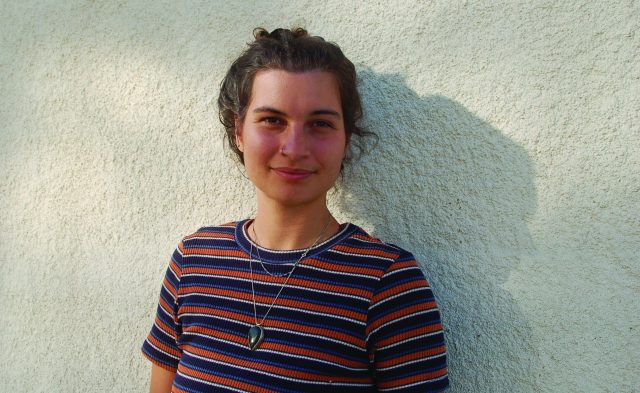
Becoming self-sufficient.
Why are you taking part in KYOTO?
I’m worried about climate change. It’s too warm. I lived through all of this last year. It’s beginning to burn. The climate was too dry. It didn’t rain enough. Every day, we hear the news and find out what’s going on in the world. The ice is melting. The sea level is rising. All of this scares me. Individually, there’s little I can do. I can only reduce my consumption, whether it’s plastic, meat, or the petrol I use by driving. I can’t stop climate change alone. I can just make my own contribution to prevent it for myself, to change my own small world.
A great journey begins with just one small step…
Yes, that’s what I think. I try to contribute with my share. That’s also why I’m taking part in KYOTO. Because it interests me. Because I want to know the level of my CO2 emissions in this world. Because I’ve no idea how high it is. I was curious.
When you want to know the time, you look at your watch. When you want to know your weight, you stand on the scales. But when you want to know more about your ecological footprint, you’re in trouble. Previously, you didn’t have any tool for measuring this. Now you do. You start with 3000 kyotos and you have to try and make those enough for a whole year.
I’m really looking forward to finding out. I’m sure there’s still a lot more that can be done to protect the environment, mainly at the level of the regional economy. I’m a vegetarian. I think there’s a lot of fruit and vegetables produced locally in Monchique, and we could produce even more, also without using chemicals. We have to make an effort to clear the forests of their undergrowth and we have to put an end to eucalyptus. Unfortunately, eucalyptus keeps coming back. You cut the tree down and it always grows back again. It takes our water from us. Only after cutting a tree down six or seven times does it stop growing back. It’s spread amazingly for several decades now. It’s unbelievable. We’ll only be on the right path when we start removing the eucalyptus roots and begin planting our own orchards and trees that don’t make the fires worse.
What do imagine your life will be like in 2030?
I live in a community and I imagine we’ll have a vegetable garden together. We’ve already started planting lettuce, tomato and radishes. They’re coming up now. And that’s my goal, being increasingly able to live off my own garden and depending less on what I consume from the supermarket. Having my own garden, my own hens, and my own eggs. I don’t eat meat, but I want to be self-sufficient.
Thank you.
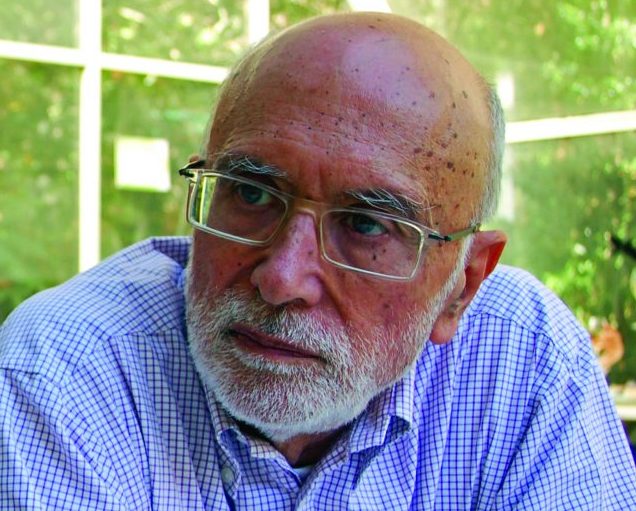
What motivated you to participate in the KYOTO game?
The possibility of collaborating in an initiative that seems interesting to me, although I’m not yet fully aware of how it’s all going to work, but I think I’ll catch on soon. And because I believe that raising awareness and interest in these issues of our ecological footprint, especially in relation to climate change, is very important and very useful for everyone. Also to have another perception of our ecological footprint or how to manage it.
What do you expect from politicians in relation to the environment?
To be honest, I think we’re facing several decades of going backwards and forwards. In other words, there’ll be a certain type of pressure from some scientists, especially those linked to climatology and environmental organisations, and grassroots citizens, who will try to drive things on and forge ahead, while the public officials, with a few exceptions, will pretend they agree, but they won’t do much. I see something like a social and political dialectic of stopping and starting. Not me so much, but my grandchildren, will hear this talked about for a long time. I don’t think a substantial solution is feasible. As long as there is the practical and economic possibility of exploiting fossil fuels, states and governments will find it very difficult to give up favouring companies that engage in this type of economic activity.
Based on this dialectic that you spoke of, how do you envisage the future in the short term?
On the one hand, there will be a certain investment in alternatives and in renewable energies, but these will generally be taken over by large companies that have already been part of the fossil-fuel past: oil companies, coal, electricity, etc. But there will also be a worsening of the climate crisis, with more floods, more typhoons and more climate instability. The trend will be to head towards a certain chaos and permanent instability. I don’t think there are any major short-term solutions emerging. On the other hand, this is also a pretext for solutions, which present themselves as alternatives, but which also have a tremendous environmental impact. For example, electric cars may be considered less polluting, but basically they involve an assembly line or an industrial process that causes them to have very strong and negative impacts. In Portugal, we’re close to having serious problems, which are still not being talked about in the public opinion, or only very vaguely, and which involve the destruction of areas where there are possibilities of prospecting for and mining lithium, which is an important element in the production of batteries for electric cars. And if there is no other technological option for this, we will see strong pressure to have opencast mining, which will be aggressive and have a huge impact on the environment, although it has the appearance of being environmentally useful, because of the electric cars. In fact, there is already considerable resistance in some areas that are being targeted by companies working in this sector.
Thank you.
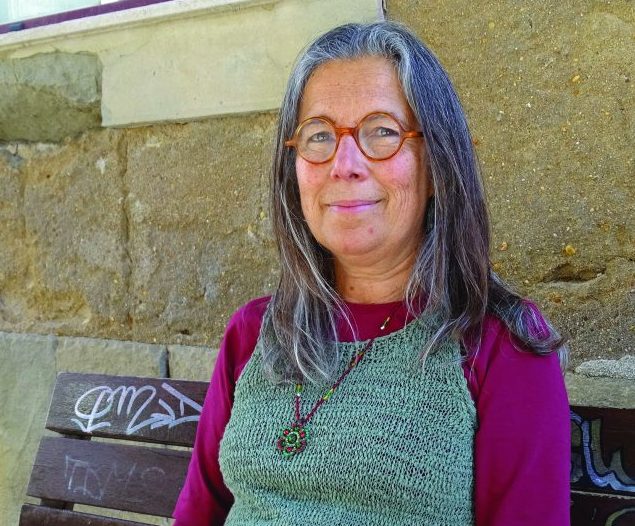
What is your motivation for participating in the KYOTO game?
I’ve always been aware that natural resources are limited and so we have to know how to use them. Furthermore, I’ve always been concerned about having a healthy and environmentally friendly life. The idea of being able to calculate or measure my ecological footprint, and especially learning how to reduce it, was something that tempted me a lot. It was the idea of actually having the chance to measure my ecological footprint in my day-to-day life, knowing, of course, that I have restrictions and conditions. Starting with the place where I live, which is in the countryside, far from the city. But then there’s also the kind of house and the kind of car that I have. All these are factors that may not allow me to reduce much during this experimental year, but I will try as hard as possible, under the conditions that I have, to be able to reduce CO2 emissions in my daily life.
What are your expectations about politicians’ behaviour in relation to the environment?
They show little concern for nature conservation or for the protection of biodiversity. For example, here in the Algarve, they’re increasingly promoting the planting of monocultures, something that involves an exorbitant consumption of water. In fact, near here where I live, we have orange trees and avocado trees. We also have monocultures of olive trees and almond trees in the Alentejo, with an enormous water consumption. That is, they don’t care about water consumption, they don’t worry about energy costs, the lighting in towns and cities and the amount of light bulbs they have. They’re not bothered with raising people’s awareness about the need to separate and recycle rubbish, or excess packaging. When we go to the supermarket, it’ s distressing to see the amount of packaging we bring home, associated with the different products. I don’t see much concern about a number of issues generally which will inevitably create consequences for climate change.
What measures do you consider are urgent to take and can be put into practice?
There are so many measures that are easy to implement. For example, where I live, very close by we have those same monocultures of avocado trees, which are hundreds of hectares in size and have begun to appear here in the municipality of Lagos. It’s heartbreaking. How do they approve these projects? These projects are subsidised, which entails exorbitant water consumption. It’s unbelievable how many plantations there are, all consuming water from the same aquifer. It’s incredible to see this nowadays, when there are months without rain in the Algarve. And then there’s the transport, because, to make matters worse, almost everything is for export, with the consequent emissions of CO2 produced by the journey to their destination. There are so many measures that they could take, starting by focusing their attention on these authorisations and incentives for something that is completely wrong. Besides, in the middle of this, everything that there is on the land is extracted to implement these monocultures.
Thank you.
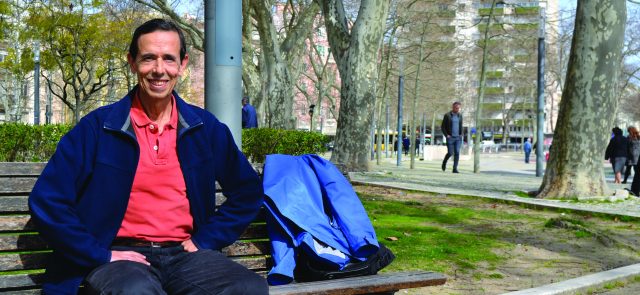
José Paulo Carraca, aged 62, computer specialist, Lisbon
“Happier working less”
What makes you feel good and usually fills your days?
I took a degree in Economics and then I got into Computer Science. I was a pilates instructor and I’m a qualified acupuncturist. Knowledge gives me pleasure.
Even before I had two little girls, I always tried to work less than 8 hours a day. Working hard takes away our choices. Apart from people who are living in economic hardship, most of us could easily work less and be happier. As soon as people become aware of the reality of environmental degradation, they have to decrease their patterns of consumption. And then it becomes easier to be happier and to be working less. Even though I enjoy what I do – I’ve never gone to work saying “ah!” (Laughs)
Where does this concern with the environment come from?
I would have thought that it would be universal. Nobody likes to mess up the house they live in, to have an untidy house, with nobody doing the kitchen chores…! How is it that we have a planet, our shared home, that is so neglected? You don’t need to be a great intellectual, or to follow some project or vision of the world, to see what’s happening.
What most saddens or upsets you about what is happening?
As an economist, what upset me most was that economists had always been very unconcerned about science and reality. Amongst the 500-page economic textbooks there is one that speaks of “externalities.” If a person has a pig farm and doesn’t pay the cost of cleaning up the damage he causes, someone else will have to pay for it. The cost is not included in the price of what you sell, but it exists. It turns out that in January there was fantastic news – the most important thing in the last 50 years: twenty-seven Nobel Prize winners for economics, plus several top economists, now say that we need to have a carbon tax. This should be progressively regulated until externalities are internalised in the price of things. When we set the price for electricity produced from coal or petroleum products, or tax a product that comes from far away, everything will become much more expensive. And states that apply this rule will be left with large budget surpluses. These cannot exist, otherwise society will go into recession. It turns out that this cream of the world’s economists has a very interesting proposal: this money must be returned in equal portions to each citizen – one of the aspirations of the Universal Basic Income. It’s the great hope of bringing an end to the slavery of paid work.
If you could programme tomorrow’s world, what would it be like?
There are already so many of us in this little world, we have to understand each other. Without having pre-conceived ideas of what is good or bad. Much of the anger we see, Trump and Bolsonaro, and so on, it’s because there’s a politically correct way of speaking… “Yes, sir, the rights of this, of that…” We can’t have bullfights.” I’m against bullfighting myself. I don’t go. I know it’s stupid to have an animal which is forced to suffer in this way. But I’m not against bullfighting. The council can say whether it wants it or not and so we are left with only Santarem and Beja … But central government can’t be telling us that we “have to accept the blue or the grey.”
I’m all for citizens’ assemblies. We come to better conclusions through dialogue than with this idea of democracy as a contest for votes.
Thank you.
.
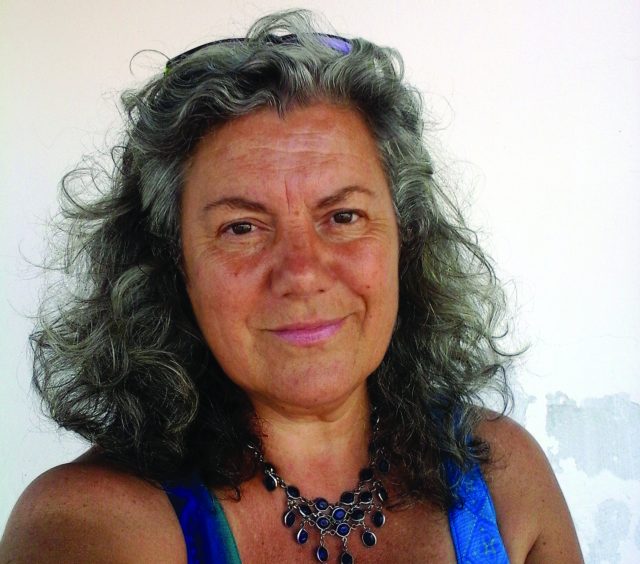
What is your personal and professional background and how did you develop your passion for ecology?
I was born in Porto into a lower-class family of five, and I studied geology. I worked for nine years as marine geologist at the National Laboratory of Energy and Geology in Lisbon, doing scientific research on oceanographic ships. During this time, I got to know environmental NGOs, learning about the idea of organic farming, and my interest in the environment grew. I wanted to produce my own organic food, which was not really compatible with living in the city. One day, my former boss told me I had to start a PhD in Geology.At that point, I felt I was at a crossroads: either I have to invest my time and energy in something I was losing interest in, or I had to pursue my passion for ecology. I chose that. It was an enormous change. I gave up city life, my good income, consumption habits and career and moved to an organic farm in Ferreira do Alentejo.
How did you like that?
It was a total change. I produced my own food, selling the surplus every weekend to the organic cooperative in Lisbon. Above all, heirloom seeds became my passion, and together with some farmer friends, I founded the first national traditional seeds network in Portugal. I was like a thirsty sponge studying all topics relating to the environment. Later I accepted the invitation to coordinate the “Environmental Olympics”, a huge environmental competition for secondary schools all over Portugal run by the Environmental Studies Group of the School of Biotechnology of the Catholic University of Portugal. For five years, I had the privilege to work only on ecological topics, to learn everything about compost, recycling, waste, ecologic footprints, consumption, etc. It was a great time, the group was very radical and miles ahead of many other organisations at that time, and I studied these topics in depth.
And were you happy?
Yes and no. After five years, living once again in a large city, I realised I had to move again to the countryside to have a more healthy lifestyle. So I came to Tamera in 2006, where I have lived ever since. What attracted me to Tamera was the concept of an ecovillage, which I found very convincing, especially in the research areas relating to water, energy and food autonomy. The whole place has developed much more since I first arrived here. Now I live in another village, 5 km from Tamera. What I don’t like about this option is to be forced to use the car every day. Without a car, it would be difficult. I really want to find an alternative. My dream is to learn to ride a bicycle.
What are your expectations with the KYOTO game?
I already know my ecological footprint and hope to be able to live with 3000 Kyotos. I expect that I’ll have to change some habits. The car is one of these things.
What do you reckon is your biggest sin in terms of climate?
I love cheese and eggs and, on rare occasions, I also eat meat. Food and transport are the biggest impacts.
Now that you’re focusing on changing your personal consumption, but considering that you form part of a system that produces a lot of CO2 emissions, and taking into account industry, the armed forces, etc., what do you think about the contradiction between changing your personal life and the system itself?
It’s a parallel change. We can’t ask companies to accept environmental policies if we don’t adapt them in our personal lives too. And, at the same time, we have to influence the policies. Working on only one of those sides won’t get us anywhere. The big producers and polluters must be addressed too in this change.
What challenge do you see for Portugal as a country in its efforts to improve the climate situation?
Portugal has a lot of homework to do, starting with energy production. In Tamera, I was involved in the long fight against oil prospecting. Portugal needs to invest much more in decentralised alternative energy sources and completely drop the terrible idea of drilling for oil and gas. We also have to stop monocultures, agroindustry and industrial animal production: their impact on the soil and water is dramatic. And it’s absurd to fund this with EU money. A very crucial topic is water: in a country that is so threatened by climate change, where it rains less every year, we still aren’t making the big shift to sustainable water management. Instead, we’re investing in huge dams and water supply systems. For instance, it’s a totally wrong decision to have the Alqueva reservoir providing water for the whole of the Alentejo. All these are systems that produce too many CO2 emissions. There are alternatives, and we should use the EU funds in a way that doesn’t destroy the climate or the natural resources and biodiversity.
Thank you.

Isabel Correia, aged 45, artist, Lisbon
“People full of money and power are stuck in fear.”
What talents have you developed and put into practice in your life?
I’m an artist and a teacher of drawing. I‘ve given lots of lectures and was a guide at the Museum of the Orient in Lisbon. I’ve been a practitioner of Buddhism for 18 years. The question of self-knowledge and the pursuit of freedom are central to my life. In the last two years, I’ve been developing the Upaya Environmental project, linked to the Upaya Centre, a centre for meditation and the cultivation of a conscious life. It all sprang from an impulse to not only work with ecology at home, but to become more involved in activism and in collective organisations. I like to participate in eco-gatherings and climate demonstrations.
What things in the world around you sadden or upset you?
The prime causes of all crises, ecological, economic and social, are greed, selfishness and possessive desire. There are people with such a high level of selfishness and blindness in relation to others and to the whole … Even those who hold great power and wealth end up being the victims of their own trap. If the world collapses, they will fall too, however well they are protected. These countries that are becoming extremely right-wing – it’s the result of deep fear. These people full of capital, money and power are stuck in fear. Fear is the cause of enormous suffering.
This ignorance of our nature is saddening. The indifference to the suffering of the other. But I also recognise that I’m part of it. I’m always experiencing difficult situations around me and people don’t want to see. Denial is one of the characteristics of the human being. Also in relation to climate change.
Denial…
We humans are in denial of our own death. It’s the subject that people most refuse to confront in contemporary western society. Nor do we cultivate preparation for death. How are we going to deal with the collective, mass death of all human beings? We go into denial, or we enter into anger, resignation, or despair.
Your desire to put up posters, to do things, where does it come from?
It was two intensive years in the Upaya Environment. The sense of urgency gave me adrenaline. It was like fuel…! I seemed like a puppet being guided by something. I think it comes from fear. Our life is in danger … I became a mother five years ago. I empathise with all the people who have children. It’s all about seeing the next generation without any future. Either you become depressed, or you gain the strength to do something! What I’m trying to do is to combine my skills: dharma, ecology and art.
If you could draw tomorrow’s world, what would it look like?
Possessive desire, anger and problems all dissolve when the human being recognises his or her immense potential and deep nature, recognising that we are streams of flowing relationships, not solid and independent entities. Buddhism believes that all beings have this potential. From this starting point, societies and communities are certainly going to be built with values of collaboration and sharing. I imagine a diversity of cultures and of aesthetics. The earth as a living, sentient being, worthy of respect, veneration or service and no longer as a resource to be endlessly exploited.
We have really very little time. 12 years to make a radical change. This situation of urgency and imminent danger is, at the same time, a unique opportunity for humanity to grow up. We are like adolescents. We just want entertainment, sensory pleasures. “Wake up!”, do you understand? Let’s grow up.
Thank you.

João Oliveira, aged 41, founder of MushMore, Lourinhã.
“Working with nature”
What’s been making you feel good and filling your days recently?
I’m moving to the Algarve, to a farm where I’ve negotiated a lease. The intention is to develop models of coexistence between human activity, agri-food production and nature conservation. “Every monkey has its own branch.” To protect wild species and recover indigenous Portuguese breeds of chickens, goats and sheep… If we have so many fires, it’s partly because we only have animals as livestock. So we have a homogeneous forest, without vertical stratification. In the forest – which is not a forest, it’ s industry – the eucalyptus grows all at the same time after being cut, so it has absolute continuity horizontally, which promotes fires. This doesn’t happen when there is natural, self-regulated herbivory, with predators.
With models of coexistence between the human being and the ecosystem, we don’t need pesticides because we have birds that eat the insects, we have reptiles and amphibians. We don’t need fertilisers, because we have animals that instead of blue balls, leave black balls, shit which is wonderful for fertiliser. We don’t need herbicides because we have geese. Nor do we need tractors because we have chickens. It’s a life-time project. The goal is to reach that optimal plateau that we had in agriculture maybe 200-300 years ago, along with all the current technology, knowledge and understanding.
At an academic level, I’m doing a master’s degree in management, consolidation and natural resources. We’re making an environmental restoration of Foz do Muge in a team from the School of Agronomy.
Professionally, you’ve come through journalism …
I graduated in sociology. I followed a similar path to that of many others, from cafés to petrol pumps. Then I had an opportunity as a photojournalist for a tourism and environment al magazine. In Germany, I worked in business communication. A company producing fungal cultures and inocula for the food industry offered me a job in Holland. By sheer accident, I ended up being drawn into the laboratory processes and became a laboratory technician in mycology. Later I returned to Portugal and created the MushMore cooperative.
It’s an area that was just starting out: microbiology and all the importance soil has in sustaining, protecting and developing agroforestry systems. The Ecolução brand was created, in a consortium with the Regenerar Project and in contact with associations and movements that emerged after the fires. It provides services of environmental restoration and productive rehabilitation, within this matrix of working with nature – and so saving all the effort and money wasted in fighting it.
Where did your interest in ecology come from
In Germany, I ended up having a heart trauma, which gave me a heart attack, and a “near-death experience.” Usually you don’t come back. I had the enormous luck, 0.0001%, of being able to come back and talk about it. It has radically changed my life. The near-death experience really revealed the importance of ecology. It’s as if you were observing the face of the sun, with the sound of the sea, feeling the wind at a tremendous speed. It was a turning point.
Earlier, when I was on the Erasmus programme and I climbed to the top of a mountain, alone, in the Alps, that was the pantheistic moment, the first moment of consciousness.
Thank you.
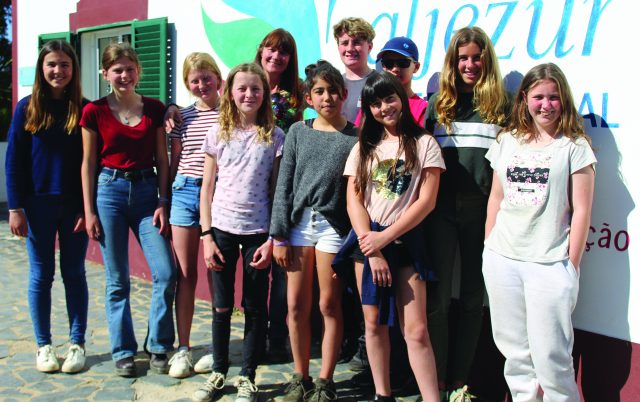
What is your motivation for participating in the KYOTO game?
I became aware of the subject and it aroused my interest. Essentially out of curiosity, I was curious to know what my ecological footprint is. I’ll probably be surprised, but I’m afraid it will be in a negative way. Essentially I want to know what my ecological footprint is at this moment in time. Even for my own education, knowledge and above all to have a higher level of awareness of my practices and their consequent implications for my ecological footprint.
What are your expectations of politicians in relation to the environment?
I’m an eternal optimist. I think that all politicians at the moment are going through a stage of madness. We live in crazy times nowadays, but I’m an eternal optimist. Look at Donald Trump for example. At this moment, it seems to me that those in power at this time are selfish people, who besides their ego are playing lots of games and are not taking into account the interest and needs of the population, the people. For example? The terrible way in which British politicians are dealing with Brexit. Recently, in February, climate change was discussed in the British Parliament, and this was the first time that topic had been discussed in parliament in the last two years, which to me is quite shameful. But I believe the future can bring something good. When there are such crazy people in power, I believe that there will be something, a kind of revolution, not a bloody war, but possibly the younger generation will be able to come to power and then try to compensate for the mistakes we’ve been making up till now.
What kind of activities have been started in your school in relation to the environment,?
We do many things and we are developing several projects in this area. We try to make our students aware of the importance of protecting and maintaining environmental balance. Agriculture has a fundamental role at our school, we have a garden where we plant vegetables, the students plant them, see them grow and harvest them weekly so that they enter our food chain. It gives them knowledge about how products grow and develop, from being sown in the ground to reaching our table. In fact, agriculture is an integral part of our school programme. We are also in constant contact with a person who is running a school in Syria, and we fundraise for their cause. We support school projects and students in Kenya. For us, it’s important for children to be aware of their surroundings and of the greater world around them.
Thank you.
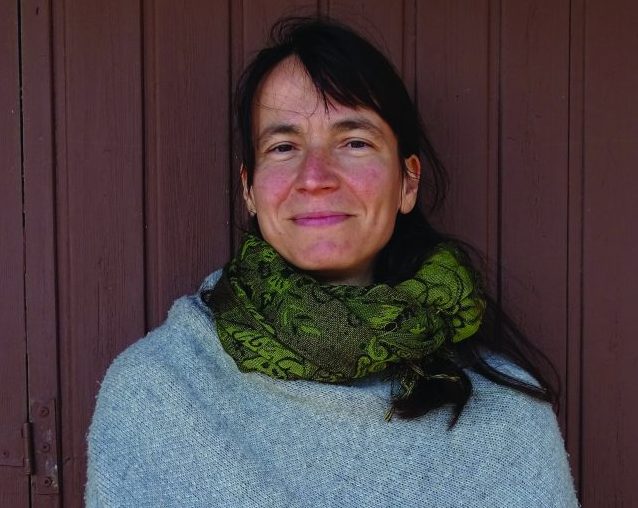
What is your motivation for participating in the KYOTO game?
Mainly to have a better perception and understanding of my ecological footprint. And also because, ever since I was little, I’ve had a kind of obsession about understanding how I can contribute to nature being conserved as much as possible and also how to keep the environment more balanced in its essence. I was offered this possibility and I found it interesting to be able to participate and understand what my practices are and what I can improve in my day-to-day activities and habits.
What are your expectations of politicians in relation to the environment?
I hope there will be increased investment from politicians and more resources made available for the reforestation of countries in general. Beginning with Portugal because there are several regions that are in danger of desertification. I hope that they will look at things in a new light, abandon the policy for eucalyptus and start investing more in the planting of indigenous trees, and I hope they’ll give people the motivation to plant more of these trees. At an international level, they should make people more aware of the need to protect the environment and make the decision to eliminate plastic, but also to reduce the consumption of meat, which sometimes isn’t necessary. They should reduce waste and unnecessary expenditure on food, or reduce the emission of gases into the atmosphere. I hope that they promote greater investment in organic farming and, above all, family farming, and that they invest more in small producers.
Being Italian, why did you chose to live in Portugal?
I chose Portugal because it’s a very peaceful country. I live alone at the moment: it’s my choice to live alone at this stage in my life. I feel safe here and in Italy this was not the case. Besides, I feel good here, I feel a good energy and empathy with the people from here.
Thank you.
 Eco123 Revista da Economia e Ecologia
Eco123 Revista da Economia e Ecologia

